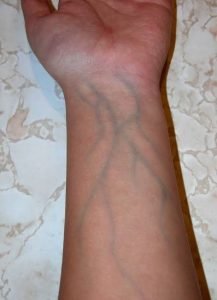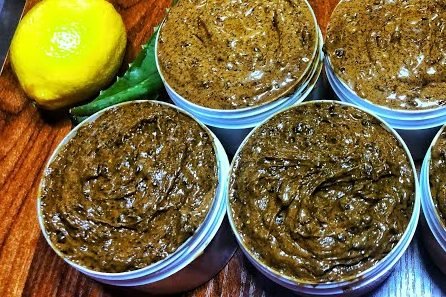Hadiza Ibrahim delves into the world of Nigeria’s unregulated organic skin care industry and highlights the urgent need for stricter oversight to check rising health challenges arising from unwholesome manufacturing practices.
There is an increasing patronage of organic skin care products, which are loved by many Nigerians who believe they are safer to use than other processed products because they are often handcrafted in homes using ‘natural’ ingredients. In their relentless pursuit of beauty and radiant skin, they ignore what lies beneath the results they desire.
”Green veins and stretch marks”
”I was drawn by online reviews and a friend’s glowing recommendation to a particular brand or organic skin care products and had positive results,” Chenemi James, a student at Nasarawa State University, told African Health Report (AHR). However, after weeks of use, she started to notice green veins and stretch marks on her skin.
She recalls, “I read the ingredients, but I’m not sure if what was listed matched what was used, and there was no NAFDAC approval or number on the product.”

Esther, a youth corps member, also fell victim to a widely publicised skincare product lacking NAFDAC clearance. She said she experienced severe breakouts on her face, prompting her to scrutinize skincare products more carefully.
The desire for healthier, more natural skin care alternatives has given rise to countless organic skin care brands across Nigeria. These products, touted as pure and nourishing, have gained popularity, largely due to the allure of their “organic” label. They are advertised as chemical free, containing only fruits and other natural extracts which are healthy to the skin and overall health of the user. However, beneath the promising exterior lies a complex web of issues.
It will be recalled that a few weeks back, popular Abuja skin care manufacturer/vendor, Jenny Glow, was called out for selling products that were unapproved by the National Agency for Food and Drug Administration and Control (NAFDAC), which regulates such items.
In a post on popular social media platform, Tiktok, one Chidera, using the name Sasha_bby 01 shared a video of her face before she started using a range of skin care products she allegedly purchased from her and tagging her, wrote:”Fr Jenny’s glow Nigeria should be sued and closed down because their products are nothing but trash and stupid chemicals….”
Sasha_bby 01
Fr Jenny’s glow nigeria should be sued and closed down😭💔because their products are nothing but trash and stupid chemicals @jennyglownigeria you should be arrested because you’re doing nothing but harm to peoples skin
This is one of the many cries of people who do not do due diligence before opting for uncertified skincare products. NAFDAC later raided Jenny Glow’s Abuja office, and stated that some products on sale had not been certified by the agency as safe for public use.
Unverified Chemists
Many of these organic skin care products are created by individuals driven by profit, often lacking the qualifications and expertise of certified cosmetic chemists. What’s more, some products marketed as “organic” fail to meet the essential 95% threshold of natural, plant-based ingredients, instead incorporating synthetic elements. This raises concerns about the transparency and authenticity of these products.
It is troubling that a significant number of locally produced skin care items lack the crucial stamp of approval from NAFDAC. They even circulate in the open market without valid NAFDAC registration numbers, readily available to the public.
Mr Godwin Onyeugbo, a professional Graphic Designer who has designed for such brands, expressed bewilderment over people’s continued use of non-NAFDAC approved products when he spoke with AHR on unsafe organic skin products.
He remarked, “When I design for these brands, I often wonder why people still use these products despite the absence of NAFDAC approval. It seems many don’t prioritise their skin’s health.”
Consumers should be more vigilant for their safety – NAFDAC
Prof. Mojisola Adeyeye, Director General of NAFDAC, acknowledged the agency’s efforts to combat unsafe skincare products but stressed the need for further action, including increased market raids. She cautioned consumers not to rely solely on packaging or high prices as indicators of product quality but to look for valid NAFDAC registration numbers.

Similarly, Dr. Gbenga Fagbemirokun, Special Assistant to the Director General of NAFDAC, reiterated the importance of a valid NAFDAC registration number as the primary indicator of a safe product.
On his part, Mr. Abiola Victor, the agency’s Director of Drug Laboratory Service, emphasised the rigorous testing products undergo in NAFDAC laboratories before approval.
The Way Forward: Strategies for Safer Skin Care
Mrs. Ebere Perpetual Anto, Deputy Director of Cosmetics and Medical Services at NAFDAC, identified factors such as low self-esteem, peer pressure and societal expectations driving the use of harmful skin products. She recommended legislative actions, public awareness campaigns and enforcement of bans on mercury and excessive hydroquinone in cosmetic products as strategies to curb this harmful trend.
The booming organic skin care market in Nigeria presents both promise and peril. While the pursuit of healthier skin is admirable, it is crucial for consumers to exercise caution and prioritise safety. NAFDAC plays a pivotal role in ensuring product authenticity, but it is imperative that individuals remain vigilant and informed. Ultimately, the path to radiant skin should not come at the cost of health and well-being.



